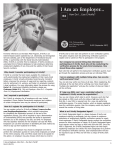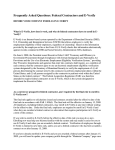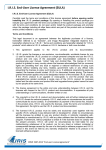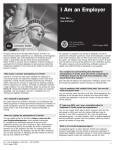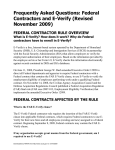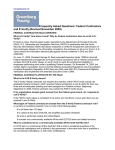Download EEV Fact Sheet - Marietta City Schools
Transcript
I Am an Employer... E4 How Do I…Use the Employment Eligibility Verification/Basic Pilot Program? M-655 (01/07) The Employment Eligibility Verification Program (EEV) is an Internetbased system operated by the Department of Homeland Security’s (DHS) United States Citizenship and Immigration Services (USCIS) in partnership with the Social Security Administration (SSA). The EEV is currently free to employers and is available in all 50 states. The EEV provides an automated link to federal databases to help employers determine employment eligibility of new hires and the validity of their Social Security numbers. Am I required to participate? No. EEV is voluntary for all employers with very limited exceptions. (Some Federal government employers and violators of certain immigration laws may be ordered to participate). Why should I consider participating in the program? EEV is currently the best means available for employers to electronically verify the employment eligibility of their newly hired employees. The EEV virtually eliminates Social Security mismatch letters, improves the accuracy of wage and tax reporting, protects jobs for authorized U.S. workers, and helps U.S employers maintain a legal workforce. For more information about the Form I-9, Employment Eligilibility Verification process, please see Fact Sheet E-1. How many employers currently participate in the EEV program? As of December 2006, over 12,000 employers representing over 45,000 sites are participating in the EEV program. How do I register for participation in the EEV? You can register online for the Employment Eligibility Verification Program at https://www.vis-dhs.com/EmployerRegistration, which provides instructions for completing the registration process. At the end of the registration process, you will be required to sign a Memorandum of Understanding (MOU) that provides the terms of agreement between you the employer, the SSA and DHS. An employee who has signatory authority for the employer can sign the MOU. Employers can use their discretion in identifying the best method by which to sign up their locations for EEV. For example, an employer may choose to designate one site to perform the verification queries for newly hired employees on behalf of the entire company. Only one MOU would need to be signed for this option. An employer may also choose to have each site perform their own verification queries. This option requires each site performing verification queries to register and to submit an MOU to participate in the program. Our company has several hiring sites interested in participating in EEV. Each site will be conducting the verification process for its newly hired employees. How should these sites register? Each site that will perform the employment verification queries must go through the registration process and sign an individual MOU. If I sign one MOU, can I use a controlled rollout to implement the Employment Verification Program across the organization? Yes, you can choose which sites to enroll. However, remember that each site that has signed an MOU must verify the status of all new hires for that site. A new MOU is required only for a new site performing verification queries. However, if a central location, which is already registered, does the verification queries, then the company would only need to amend the number of hiring sites. I am an employer with multiple hiring sites. Can one site verify everyone? How? Yes, one site may verify new hires at all sites. When registering, the individual at the site that will be verifying new hires should select “multiple site registration” and give the number of sites per states it will be verifying. What is an EEV Third Party Agent for the EEV Program? An EEV Third Party Agent is a liaison between the EEV Program and employers wishing to participate, but who choose to outsource submission of employment eligibility verification queries for newly hired employees. The EEV Third Party Agents conduct the verification process for other employers/clients. An EEV Third Party Agent must register on-line and sign an MOU with SSA and DHS. Once the MOU is approved, the EEV Third Party Agent can then I Am an Employer...How Do I…Use the Employment Eligibility Verification/Basic Pilot Program? M-655 (01/07) begin registering employers/clients who have designated it to perform the company’s verification services. Each employer/client will also be required to sign an MOU and will have a unique EEV client number What is a Corporate Administrator for the EEV Program? An employer has the option to designate an employee as a Corporate Administrator. A Corporate Administrator is someone who has management oversight authority of the employer’s hiring sites that participate in the program but generally does not perform employment eligibility verification queries. The Corporate Administrator role enables oversight of all the company sites participating in the EEV. To become a Corporate Administrator, an individual only needs to register and does not need to sign an MOU. Once registered, this individual will be able to register company sites, add and delete users at company sites, and view reports generated by company sites. The Corporate Administrator, however, does not submit queries for verification. After an employer registers, how does the program work? Using an automated system, the program involves verification checks of SSA and DHS databases. The EEV MOU, User Manual and Tutorial contain instructions and other related materials on EEV procedures and requirements. Once the user has completed the tutorial, he or she may begin using the system to verify the employment eligibility of all newly hired employees. Can I verify the immigration status of a new hire that is not a U.S. citizen? No. EEV verifies a new hire’s employment eligibility, not his or her immigration status. What information is required to conduct an EEV initial verification? After hiring a new employee and completing the Employment Eligibility Verification form (Form I-9), required for all new hires (regardless of EEV participation), one must submit a query that includes information from sections 1 and 2 of the Form I-9, including the employee’s name, date of birth, Social Security account number (SSN), the citizenship status he or she attests to, an A# or I-94# (if applicable), the type of document provided on the Form I-9 to establish work authorization status and proof of identity, and its expiration date (if applicable). Response to the initial query is sent within seconds of submitting the query. Documents presented for Form I-9 identification only purposes (documents from “List B”) to EEV employers must have a photograph. When may an employer initiate a query under the Basic Pilot program? The earliest the employer may initiate a query is after an individual accepts an offer of employment and after the employee and employer complete the Form I-9. The employer must initiate the query no later than the end of three business days after the new hire’s actual start date. Although an employer may initiate the query before a new hire’s actual start date, it may not pre-screen applicants and may not delay training or an actual start date based upon a tentative non-confirmation or a delay in the receipt of a confirmation of employment authorization. In short, an employee should not face any adverse employment consequences based upon an employer’s use of the Basic Pilot program unless a query results in a final nonconfirmation. For this reason, if the query returns an employment authorization response, an employer cannot speed up the employee’s agreed upon start-date, as that would be disparate treatment based upon the Basic Pilot results of this employee compared to another who may have received a tentative non-confirmation. For example, Company X always assigns a start-date to new employees that are two weeks after the employee has submitted an approved drug test. After the employee has accepted a job with Company X, and after the employee and Company X complete the Form I-9, the company can initiate the EEV query. However, the company cannot speed up or delay the employee’s start-date based upon the results of the query (unless the program issues a final non-confirmation, in which case the employee should not be further employed). Employers must verify employees in a non-discriminatory manner, and may not schedule the timing of queries based upon the new hire’s national origin, citizenship status, race, or other prohibited characteristic. What is the required timeframe for conducting an employment eligibility check on a newly hired employee? Employers must make verification inquiries within three business days of hiring. Which employees should be verified through the system? As a participant in the EEV Program, employers are required to verify all newly hired employees, both U.S. citizens and non-citizens. Employers may not verify selectively, and must verify all new hires while participating in the program. The program may not be used to prescreen applicants for employment, go back and check employees hired before the company signed the MOU, or re-verify employees who have temporary work authorization. I would like to use electronic I-9s for my employees. Does USCIS offer a system that would automatically generate EEV queries from the electronic I-9s? Currently, USCIS does not offer this service, but several private companies do. Is there a “batch access” method in the system? Yes, it is called “Web-services” and is a real-time batch method. It requires a company to develop an interface between its personal system or electronic I-9 system and the EEV database. For more information and help with design speculations, contact USCIS at 1-888-464-4218. Can I terminate at any time? Yes, you may choose to leave the EEV Program at any time. Does participation in the Program provide safe harbor from worksite enforcement? An employer who verifies work authorization under the EEV Program has established a rebuttable presumption that it has not knowingly hired an unauthorized alien. Participation in the program does not provide a “safe harbor” from worksite enforcement, however. How can I find out more? To find out more about the Employment Eligibility Verification Program, please contact USCIS at 1-888-464-4218. I Am an Employer...How Do I…Use the Employment Eligibility Verification/Basic Pilot Program? M-655 (01/07) Key Information Key forms referenced in this Fact Sheet Form # Employment Eligilibility Verification I-9 Application for Employment Authorization I-765 Employer Handbook M-274 USCIS • On the Internet at: www.uscis.gov For more copies of this Fact Sheet, or information about other citizenship and immigration services, visit our website. You can also download forms, e-file some applications, check the status of an application, and more. It’s a great place to start! If you don’t have Internet access at home or work, try your library. If you can’t find what you need, call customer service. • Customer Service: 1-800-357-2099 • Hearing Impaired TDD Customer Service: 1-800-278-5732 Disclaimer: This Fact Sheet is a basic guide to help you become generally familiar with our rules and procedures. For more information, or the law and regulations, see our website. Immigration law can be complex, and it is impossible to describe every aspect of every process. You may wish to be represented by a licensed attorney or by a nonprofit agency accredited by the Board of Immigration Appeals. Other U.S. Government Services–click or call In general www.firstgov.gov1-800-333-4636 U.S. Department of State www.state.gov1-202-647-6575 I Am an Employer...How Do I…Use the Employment Eligibility Verification/Basic Pilot Program? M-655 (01/07)



